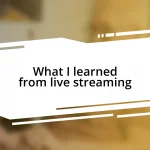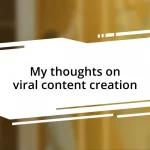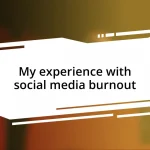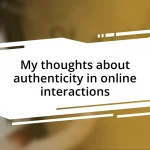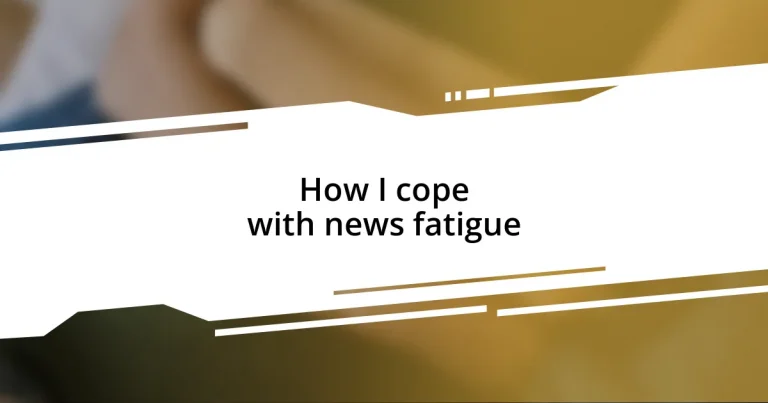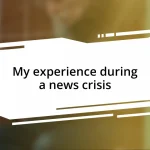Key takeaways:
- News fatigue often leads to feelings of overwhelm and anxiety; setting boundaries around news consumption helps regain control over mental well-being.
- Identifying personal triggers and maintaining a curated list of reliable news sources can mitigate stress and enhance understanding.
- Incorporating media breaks and practicing mindfulness techniques can refresh perspectives and reduce anxiety caused by news overload.
- Engaging in balanced discussions with others encourages diverse viewpoints and provides a sense of comfort and clarity about heavy topics.
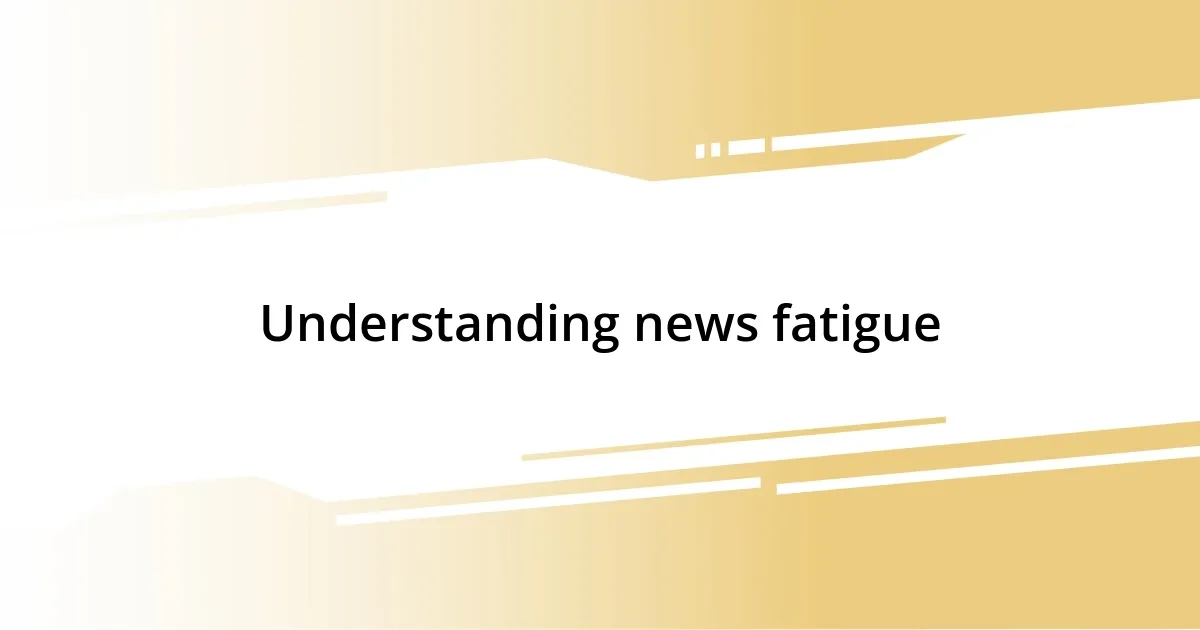
Understanding news fatigue
News fatigue is a phenomenon many of us encounter, often leading to feelings of overwhelm and anxiety. I remember a time when I had to force myself to put down my phone after watching back-to-back news clips; my heart raced with every notification. Doesn’t it feel like the news cycle spins faster each day, piling more and more on our already heavy mental plates?
The impact of constant news updates can be profound, leaving us emotionally drained. I’ve noticed that when I immerse myself in distressing headlines, my mood shifts significantly—it’s like carrying an invisible weight that just won’t lift. How can we process so much negativity and still maintain our mental well-being? It often feels impossible, doesn’t it?
Moreover, the repetitive nature of news stories can create a sense of déjà vu that leaves me feeling stagnant. I ask myself, am I genuinely informed, or have I just been fed the same narrative over and over again? This introspection has prompted me to set boundaries around my news consumption, allowing me to step back and regain control over my mental landscape.
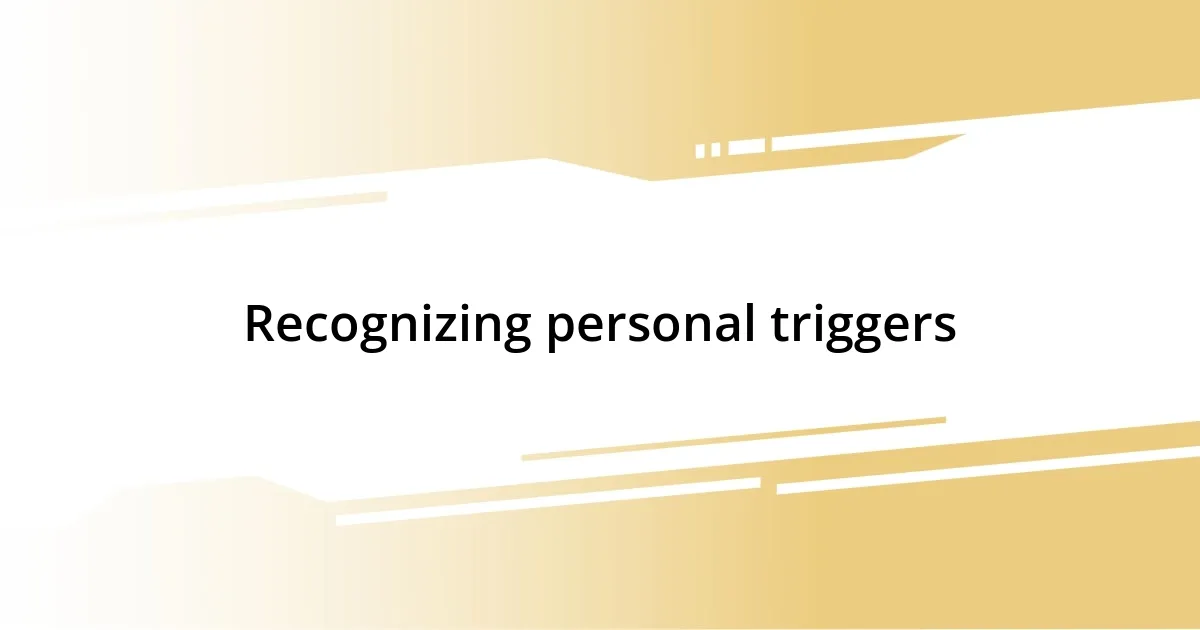
Recognizing personal triggers
Recognizing personal triggers is essential in managing news fatigue effectively. For me, certain phrases or stories can trigger anxiety almost instantly. I recall a day when I heard news about natural disasters; my heart would race, and I felt a tightness in my chest. Such strong reactions remind me that I need to be aware of which topics impact me the most.
It’s interesting how even seemingly minor triggers can accumulate stress over time. I’ve realized that while I can handle an occasional heavy news story, several in a row leave me feeling overwhelmed. A simple reminder, like taking a deep breath when a specific headline pops up, has become my go-to strategy to help mitigate those feelings.
To really understand my triggers, I’ve started keeping a journal. Reflection has helped me identify themes in the news that provoke my strongest emotions. I now have a clearer picture of what to avoid, allowing me to curate a healthier information diet.
| Trigger | My Reaction |
|---|---|
| Natural disasters | Anxiety and tightness in chest |
| Political turmoil | Feelings of frustration and helplessness |
| Social issues | Anger and overwhelming sadness |
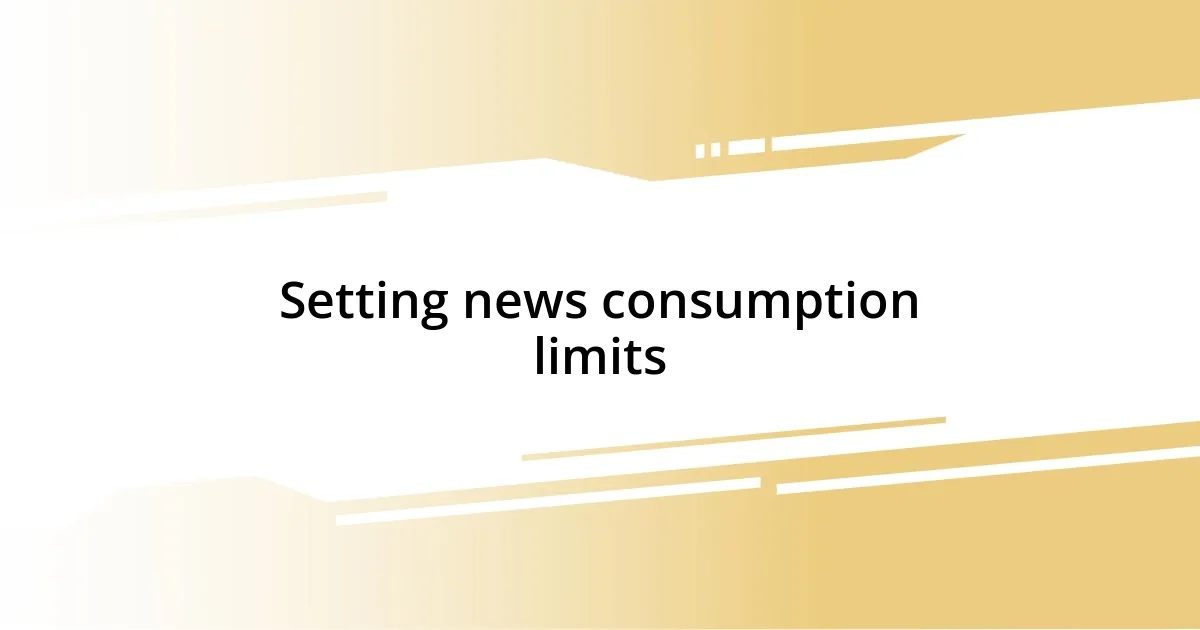
Setting news consumption limits
I’ve found that setting limits on how much news I consume each day has made a world of difference. On particularly tense days, I allow myself a quick 15-minute news check-in, then I step away. This practice keeps me informed without allowing negativity to seep into every aspect of my life.
- Establish a specific time of day for news consumption—perhaps during breakfast or after work.
- Use timers or apps that remind you when it’s time to log off.
- Prioritize quality over quantity; focus on trusted news sources that summarize content effectively.
- Incorporate non-news activities between news sessions to help create a mental buffer.
Filtering my news intake has not only lightened my mood but has also allowed me to focus on more positive activities. I used to check my phone first thing in the morning, and it would set a stressful tone for the day. Now, I’ve replaced that habit with a mindfulness exercise, creating a healthier start and helping me approach news consumption with a more balanced mindset.
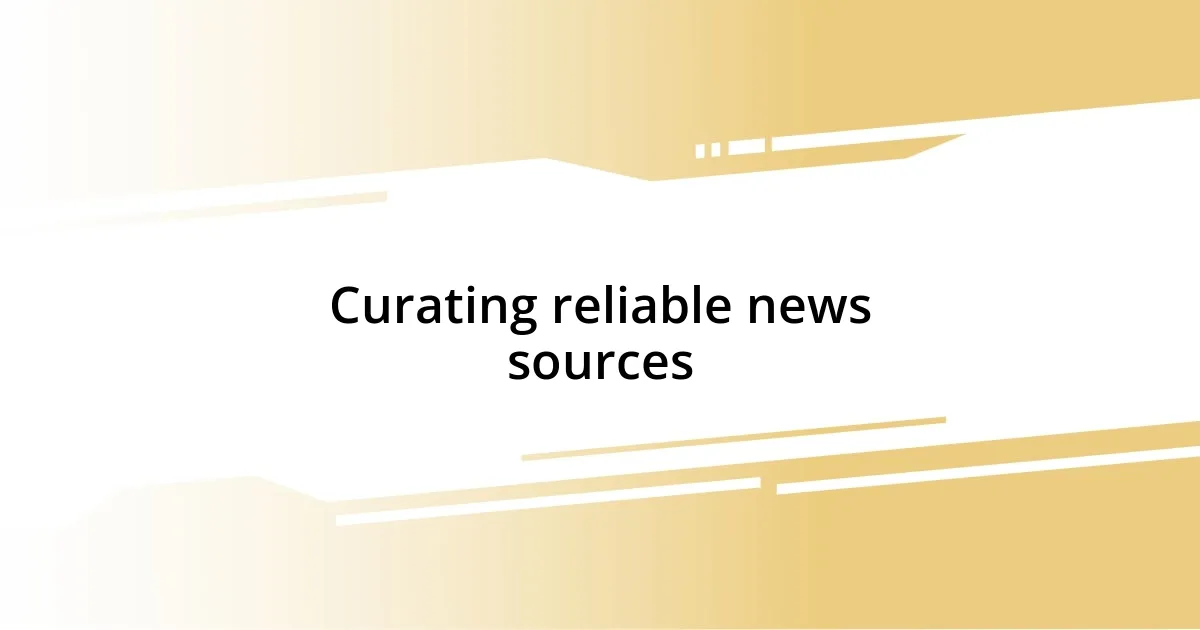
Curating reliable news sources
Curating reliable news sources has become a crucial part of my daily routine. I remember the frustration of sifting through countless headlines, only to find sensationalist articles that added to my anxiety rather than eliminating it. To counter this, I’ve committed to a small selection of trusted outlets that prioritize accuracy over clickbait. This level of dedication not only brings me peace but also protects my mental space.
This process isn’t just about picking a few well-known names; it involves constantly assessing the quality of the information I consume. I often ask myself, “Is this source reputable? Are they providing context?” I find that digging deeper into a story through credible analyses gives me a fuller understanding, helping to ground my perspective when topics feel overwhelming. It’s surprising how a solid source can help clarify the noise, isn’t it?
Recently, I chose to read news summaries from a reliable app instead of scrolling through social media, and the difference was astounding. Instead of feeling bombarded, I felt informed without the chaos. It’s a small shift, but I noticed my stress levels decreased and my focus improved. Perhaps it’s time to ask yourself: who do you trust for your news? Finding those sources is an empowering step towards reclaiming your peace amidst the barrage of information.
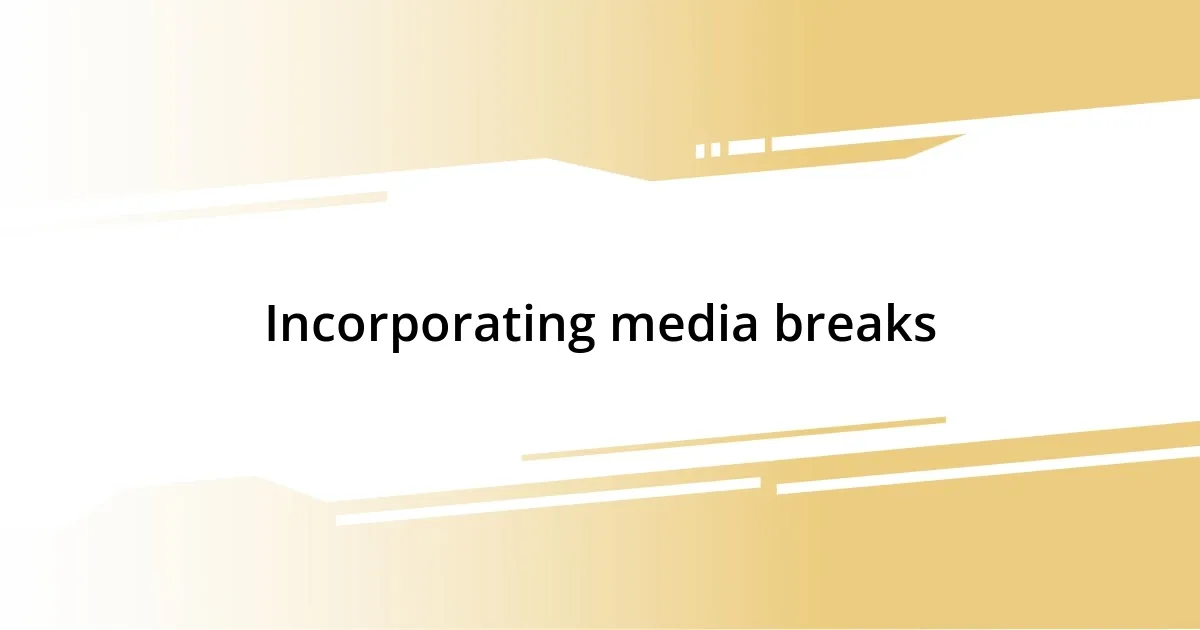
Incorporating media breaks
Incorporating media breaks has been a game changer for me. I’ve started to integrate little pauses into my daily routine, like taking a short walk or doing some stretches after a news session. This simple shift allows me to clear my head and absorb what I’ve just learned without immediately feeling overwhelmed.
On days when the headlines seem especially heavy, I set aside even longer breaks to engage in my hobbies, whether it’s reading a book or painting. I vividly recall one particularly exhausting week when I was glued to my screen, feeling the weight of the world on my shoulders. I decided to take a two-hour break to watch a feel-good movie, and it helped me switch gears completely. By the end, I felt lighter and recharged, almost like I had pressed the reset button on my mindset.
I can’t stress enough the importance of these media breaks. Have you ever noticed how your worry fades during small absences from the news? When I return from a break, I find that I can approach the information with a fresher perspective. It’s as if I’m treating my mind to a mini-vacation, creating the space I need to process and reflect without drowning in negativity. Why not give it a try? Just ten minutes can make a remarkable difference in how you feel!
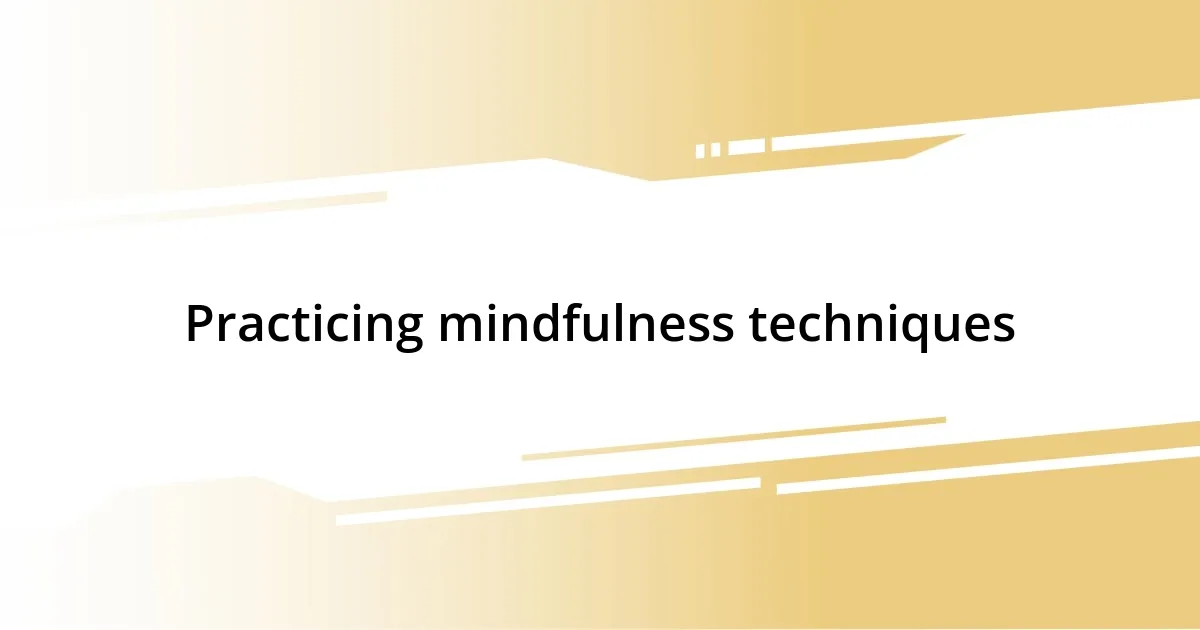
Practicing mindfulness techniques
Practicing mindfulness techniques has become a cornerstone of how I cope with the constant influx of news. I still vividly remember a day when I felt completely overwhelmed. I decided to sit in a quiet space, practice deep breathing, and focus on the sensations around me—the sound of birds chirping, the warmth of the sunlight. This intentional pause helped ground me, reminding me to refocus my thoughts rather than letting external noise dictate my emotions.
One technique that I’ve found particularly effective is the body scan meditation. It’s such a gentle, yet powerful way to recenter myself. Lying down and consciously relaxing each part of my body takes me out of my head and into my own experience. It’s incredible how tuning into physical sensations can interrupt the spiral of anxiety sparked by negative headlines. Sometimes I think: how often do we forget to listen to our own bodies amidst the chaos?
Integrating mindfulness into my routine has also led me to appreciate small, everyday moments. I began taking mindful walks, where I focused solely on my surroundings—the colors of the leaves, the texture of the path beneath my feet. Initially, I was skeptical about its impact. Would mindfully walking really make a difference? But surprisingly, it did. Those moments of presence allowed thoughts of stress to fade away. Afterward, I felt rejuvenated, not just from the exercise, but from reconnecting with the world around me. Try it out: what might you notice that you’ve been missing?
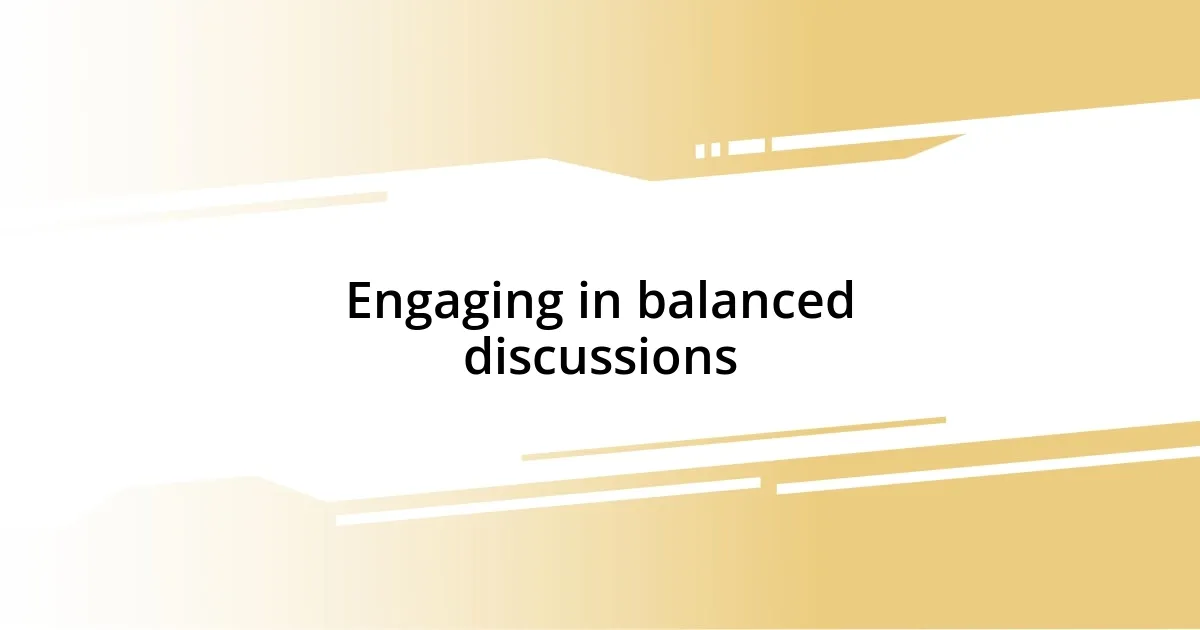
Engaging in balanced discussions
Engaging in balanced discussions has been a crucial part of my journey in tackling news fatigue. I often find that simply sharing thoughts with a friend or family member can open up a dialogue that feels refreshing. I remember a time when I met a friend for coffee; we dove into a discussion about current events. Instead of spiraling into negativity, we explored different viewpoints, which gave me a sense of balance and restored my faith in productive conversation.
At times, I’ve noticed that diving deeper into topics can be enlightening. For instance, after a particularly distressing news cycle, I organized a small gathering where everyone brought an article that sparked their interest. This not only sparked diverse opinions but also revealed layers to issues I hadn’t considered before. Reflecting on this experience, I can definitely say that engaging in these varying perspectives made me feel less isolated. Have you ever tried bringing friends together to discuss the news? You might just find that shared dialogue offers not only comfort but also clarity.
I find that while discussing weighty topics, it’s vital to keep the conversation balanced—this means acknowledging the seriousness of issues without sinking into despair. One evening, after an intense news week, I decided to start a light-hearted debate about favorite childhood cartoons with my family. It was a delightful reminder that even amidst heavy discussions, laughter and perspective can coexist. How do you ensure your discussions maintain that balance? I believe it’s about being open, listening, and knowing that it’s okay to momentarily shift focus.



